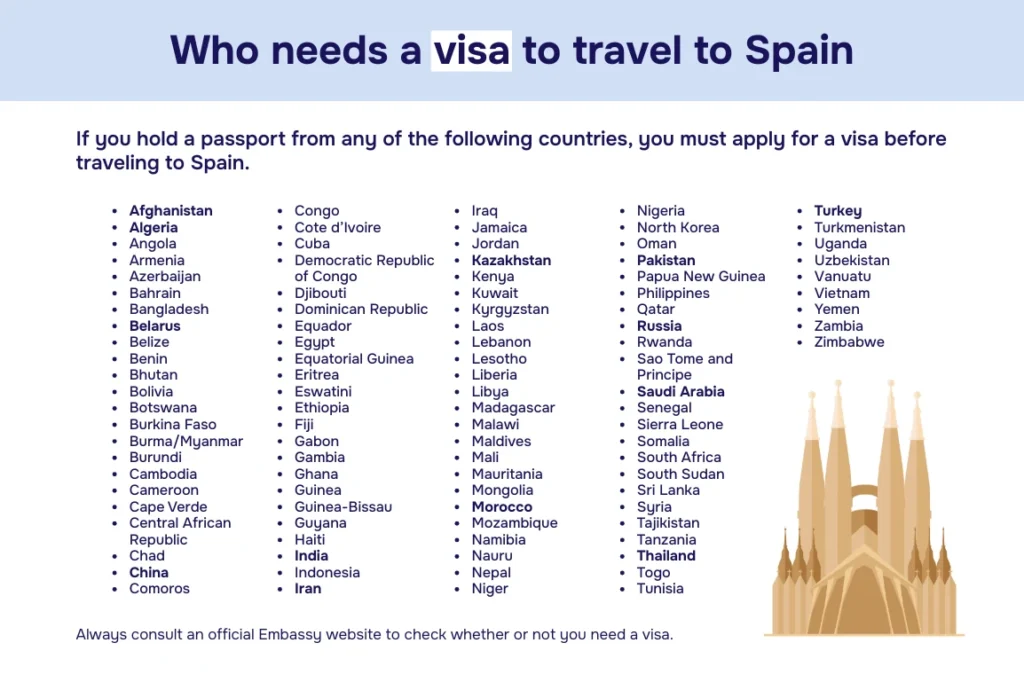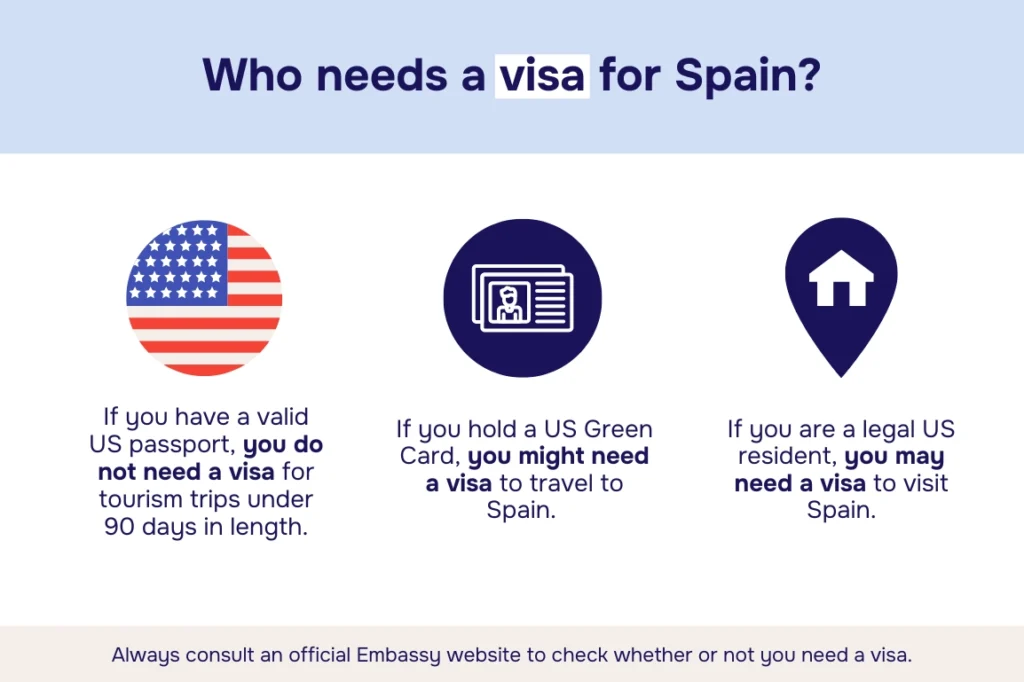Home > A 2026 Guide to Schengen Visas for Spain

A 2026 Guide to Schengen Visas for Spain
Spain is a bucket-list destination for travelers from all over the globe, featuring famous cities like Barcelona and Madrid, as well as lesser-known gems like Trujillo and Granada.
One of the most important planning steps is understanding which travel requirements apply to you and which don’t – which includes visas.
We’re here to help with a friendly guide to empower you to navigate the process with confidence and prepare you for everything you need to know about applying for a visa for Spain.

Do I need a visa to go to Spain?
Whether or not you need a visa to visit Spain depends on several factors, such as your nationality, the purpose of your visit, and how long you plan to stay.
Spain is part of the Schengen zone, which allows for short-term travel without a visa for some nationalities, including citizens of the US, UK, Australia, Canada, and others. For stays longer than 90 days, you’ll need to apply for a visa.
If you’re not from a visa-exempt country (examples include India, China, and South Africa), you will need a visa to visit Spain.

Do US citizens need a visa for Spain?
For short trips of up to 90 days, US citizens do not need a visa to visit Spain. You can travel freely for tourism, business, or family visits. However, if you're planning to work, study, or stay longer than 90 days, you will need to apply for the appropriate visa.
How to apply for a visa for Spain
Applying for a Spanish visa involves a few steps, but it's relatively straightforward.
You’ll need to apply through a Spanish consulate or visa center in your country of residence, and the steps are as follows:
- Determine which Spain visa you need.
- Collect all of the necessary documents and ensure you meet the minimum requirements. The visa center or consulate you’re applying through will provide you with a detailed list of what will be required of you.
- Book an in-person appointment.
- Submit your visa application and biometrics (fingerprints).
- Receive an answer

Can I apply for a Spanish visa online?
While you can begin the process online, you’ll need to submit your application in person at a consulate or visa application center, such as BLS. This appointment is mandatory and typically must be booked ahead of time.
In the near future, you will be able to apply for a Spanish visa online! The EU is releasing a new platform called EU VAP. This secure portal will allow travelers to apply for a Spain visa online. This system is still in development but is expected to be fully operational by 2030.
Is a visa for Spain difficult to get?
The application process is relatively straightforward. When it comes to whether or not your visa application for Spain will be approved or denied, the decision is entirely up to the Spanish Embassy.
Spanish visa rejection rates
In 2024, 15.7% of Spain visa applications were rejected globally.
It is helpful to understand that rejection rates are constantly changing and can be different depending on your nationality, the visa you’re applying for, and even seasonality. The number above, 15.7%, is global and may not accurately reflect your specific situation.
What is the processing time for a Spanish visa?
The processing time varies depending on the type of visa, but a Spain Schengen visa typically takes around 15 working days. Longer-term visas, like a Spanish student visa or work visa, may take several weeks or longer to process.
Additionally, appointment slots can fill up quickly and may book out weeks or even months in advance. This is one reason why it’s crucial to start your application early.

Spain visa application requirements
It’s important to make sure you meet all of the Spanish visa requirements when applying. These requirements vary depending on the type of visa you’re applying for, but there is a set of standard documents you’ll need to provide regardless of which visa you’re applying for.
Which documents are required when applying for a visa for Spain?
You’ll need these standard documents:
- A valid passport
- Schengen visa application form
- Recent passport-sized photos
- Proof of travel insurance that meets Schengen visa travel insurance requirements.
- Proof of accommodation
- Flight itinerary (including a return flight home or out of the Schengen area)
- Financial proof showing that you can sustain yourself for the duration of your visa
Does Spain have a digital nomad visa?
Yes! Spain has a digital nomad visa for both freelancers and remote workers. The applicant must meet specific requirements depending on their country of nationality.
The Spanish Schengen visa interview
While an in-person appointment is mandatory, it isn’t necessarily a formal interview. At the appointment, an attendant will go through your documents to make sure your application is complete.
You will likely be asked questions directly related to your documents or travel plans, but there isn’t a set list of questions you’ll need to prepare for.
At this appointment, your visa application will be checked to ensure all of the necessary documents are included. Additionally, your biometrics (fingerprints) will be collected. Then, when all of that is said and done, your visa application will be sent for processing.

Do I need to apply for ETIAS if I have a Spanish visa?
No, if you have a valid visa for Spain or the Schengen area, you do not need ETIAS authorization.
Who needs ETIAS to visit Spain?
Citizens of visa-exempt countries, such as the US, UK, Canada, and Australia, will need an ETIAS for short-term visits from 2026 onward (so as long as they do not have a Schengen visa).
Citizens of Schengen countries are also exempt.
Learn more about getting an ETIAS for Spain with our Spain ETIAS Guide.
Spain visa FAQs
The End of Spain's Golden Visa Program
For the last decade, Spain's Investor Visa (often referred to as the Golden Visa) has been allowing travelers with large pockets to immigrate to Spain.
As of April 3, 2025, Spain is no longer accepting new applications for the Investor Visa, with no intention to resume.
But what was the Golden Visa? What did it do, and why is Spain eliminating it?
We have the info.

About Spain's Golden Visa
Spain's Investor Visa allowed travelers to get short-stay or residence visas in exchange for a large investment. The amount and type of investment necessary were specific, and there were a few ways to qualify.
- In exchange for a visa/residence, applicants could give a minimum of 2M euros towards Spain's public debt securities.
- In exchange, applicants could purchase a minimum of 1M in Spanish stocks/shares, investment or capital venture funds incorporated in Spain, or in bank deposits in Spanish financial institutions.
- In exchange, applicants could purchase unencumbered real estate for a minimum of 500K euros.
- In exchange, applicants could start a business in Spain that would have a significant positive impact where the project was being carried out.
The Investor Visa is all about financially investing in Spain, through several possible angles.
In exchange for a qualifying investment, and if the application was approved, Spanish "Golden Visa" holders would be granted short-stays or residency (depending on their needs and their applications).
It was also a particularly interesting visa because it allowed its holders to bring their spouses (including unmarried partners), children (including adult children in specific circumstances), and immediate relatives.

Why Spain is getting rid of its Golden Visa
In April of 2024, Spain's Minister of Housing and Urban Agenda, Isabel Rodríguez, announced that the Investor Visa needed to be repealed.
According to her, this is the first step to solving an "exceptional problem." The problem? Affordable and accessible housing.
The Minister announced that ending the investment visa program would help Spanish residents who are having a hard time finding affordable housing.
She did make sure to point out that the decision to end residency by investment wasn't Spain's alone.
In 2022, the European Union urged all member states to repeal any investor citizenship programs (like Spain's Golden Visa, which offered a real pathway to citizenship) in place.
The numbers
Spain's Investor Visa program started in 2013. Over the span of 10 years (2013-2023), 14,576 Golden Visas were granted. The most applications came from applicants of the following nationalities:
- China
- Russia
- The United Kingdom
- The United States
- Ukraine
- Iran
- Venezuela
- Mexico
90% of approved Golden visas were for Barcelona, Madrid, Malaga, Alicante, the Balearic Islands, and Valencia.
While 14.5K may not sound like a huge number, the fact that applicants are concentrated in only six areas has had an impact on local real estate.
For instance, in 2023, 7.1% of all home purchases in Marbella were due to the Investor Visa. In Barcelona, 5.3%.
Through the Golden Visa, the most popular investment choice is through real estate. According to the Spanish government, 94% of Investor Visa applications are through the real estate investment option.
"...They [Spanish residents] can feel relieved that their government is offering a response by no longer differentiating between first-class and second-class citizens. In other words, we prioritize housing as a right and not as speculation..."
What this means for Golden Visa applicants
Spain is no longer accepting Golden Visa/Investor Visa applications, and it currently hasn't publicized any plan to reinstate the program.
For those who hold a valid Investor Visa for Spain, your visa will be valid until its expiration date. If you'd like to renew it, you can apply for renewal. Your visa's renewal will be bound by the rules in effect at the time you originally applied.
In short, no new applications are being accepted, but the status of existing Golden Visa holders isn't changing.
Similar visa guides
Planning a trip to France? Getting a visa for France
Planning a Greek adventure? Check if you need a Greek visa
Off to the Netherlands? Learn about Dutch visas
Going to Italy? Learn about Italian visas
Planning a trip to Malta? Getting a visa for Malta
Off to Iceland? Check out the Iceland visa guide
Planning to travel to Germany? You may need a German visa
Going to Hungary? Read about Hungarian visas
Planning to go to Switzerland? Read about Swiss visas
Trip to Luxembourg coming up? Read about Luxembourg visas
Off to Austria? Read our Austria visa guide
Are you going to Norway? Read the Norway visa guide
Trip to Poland? Learn all about Polish visas
Are you going to the Czech Republic? Read about Czech visas here
Going to Denmark? Read our Denmark visa guide
Going to Bulgaria? You might need a Bulgarian visa
Off to Portugal? Read our Portugal visa guide
Traveling to Slovakia? You may need a Slovakian visa
Are you traveling to Sweden? Learn about Swedish visas
Heading to Estonia? Learn about Estonian visas
Lithuania on the horizon? Learn about Lithuanian visas
Are you going to Croatia soon? Learn about Croatia visa requirements
Heading to Romania? Getting a visa for Romania
Trip to Finland on the horizon? You may need a Finnish visa
Traveling to Liechtenstein? See Liechtenstein visa information
Trip to Latvia? You may need a Latvian visa
